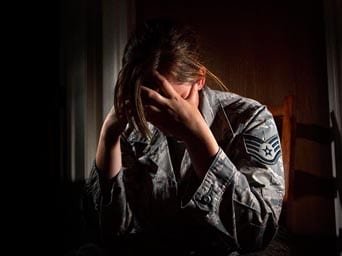 By Suzanne Laurent – [email protected]
By Suzanne Laurent – [email protected]
PORTSMOUTH — It’s a topic that is usually at the end of the day, pushed back at the bottom of the agenda during conferences for veterans, said Jo Moncher, bureau chief of community based military programs with the state’s Department of Health and Human Services.
Moncher was talking about military sexual trauma, or MST, a real problem that is under-reported. “Today, it’s up high on the agenda,” she said at the fourth annual Seacoast Veterans Conference held Saturday at Service Credit Union’s corporate office on Lafayette Road.
She turned the floor over to Judith Lambert-Messier, a licensed social worker and military sexual trauma coordinator at the Veterans Affairs Medical Center in Manchester.
“We’ve been collecting statistics for the past 10 years,” Lambert-Messier said. “But this is not a new problem. We’ve seen veterans from their mid-20s to their 80s, so it goes back at least 60 years.”
About one in five women and one to two out of 100 men have told their veterans health care provider that they experienced sexual trauma in the military.
“Although women experience MST in higher proportions than do men, because of the large number of men in the military there are significant numbers of men and women who have experienced this,” Lambert-Messier said. “In New Hampshire, there are an equal number of men and women that are MST survivors.”
She said most victims are very young in their late teens or early 20s and that it mostly goes unreported because of fear of repercussions.
A study of Gulf War I veterans showed women who experienced MST were five times more at risk for developing post-traumatic stress disorder. Men who experienced MST had a six times higher rate for developing PTSD. By contrast, both men and women were four times more at risk for combat trauma.
“This is not just a women’s problem,” Lambert-Messier said. “It is the act of exerting power, control and domination over another person.”
She went on to list the aftermath of experiencing MST. They included PTSD, depression, substance abuse/dependence, eating disorders and dissociative disorders. Victims later had problems with relationships, employment, parenting, spirituality and homelessness.
“Despite the severity of the trauma, it is possible to recover,” Lambert-Messier said. “I’ve found that working with small groups of veterans to be the most effective as they work together to heal.”
She also talked about “vets bonding with vets.”
Read More More At >>>>
ATTENTION READERS
We See The World From All Sides and Want YOU To Be Fully InformedIn fact, intentional disinformation is a disgraceful scourge in media today. So to assuage any possible errant incorrect information posted herein, we strongly encourage you to seek corroboration from other non-VT sources before forming an educated opinion.
About VT - Policies & Disclosures - Comment Policy



